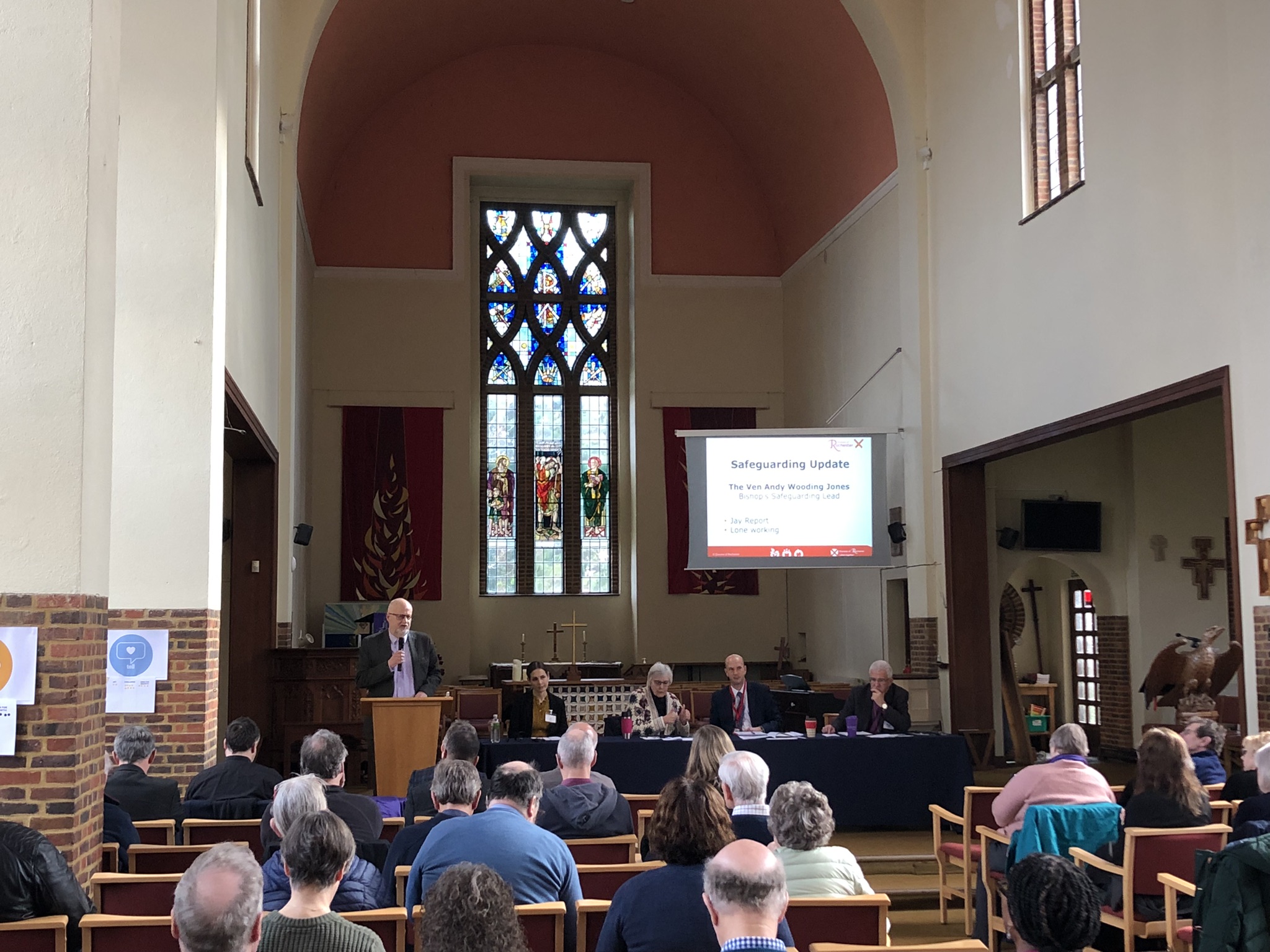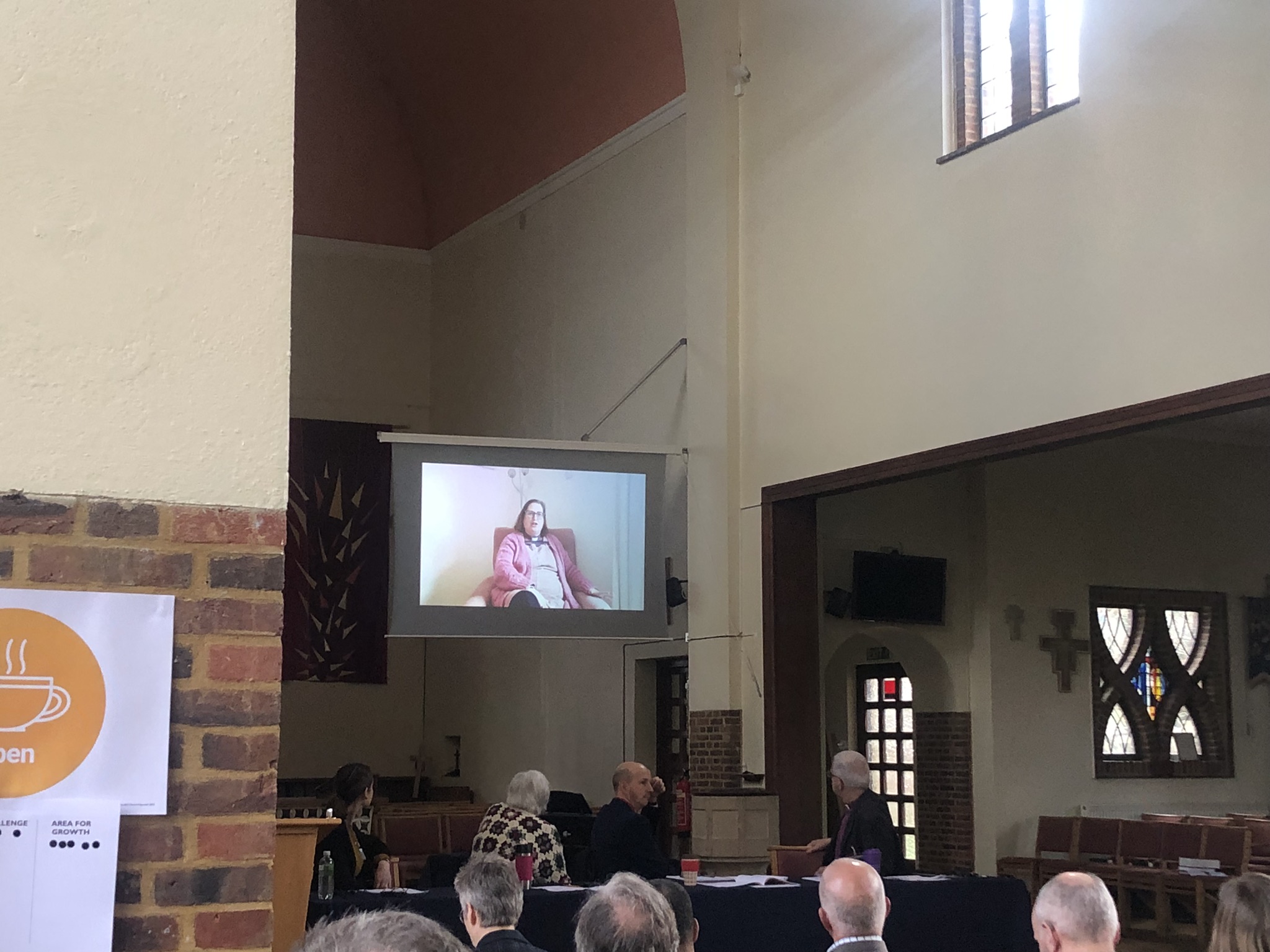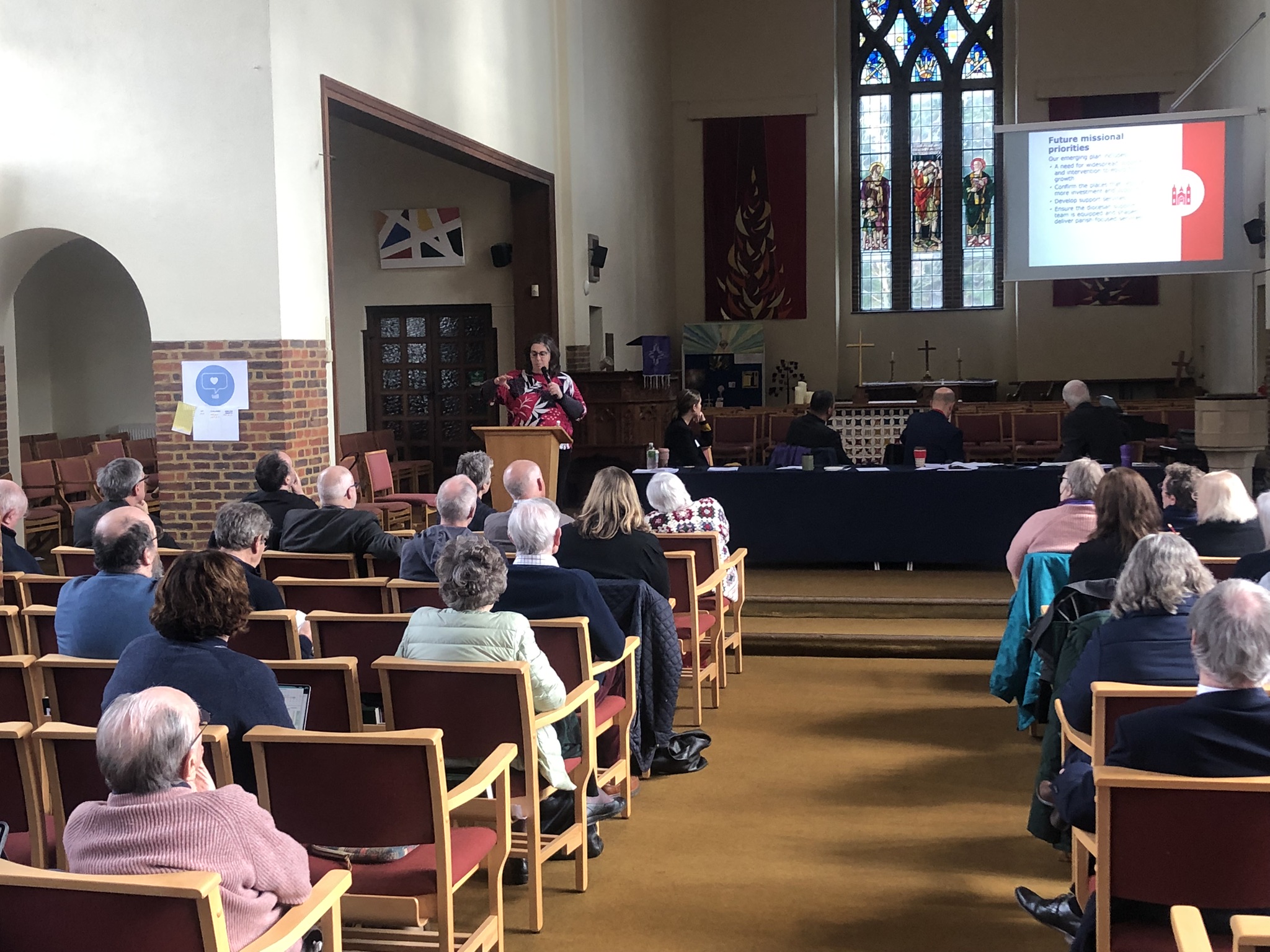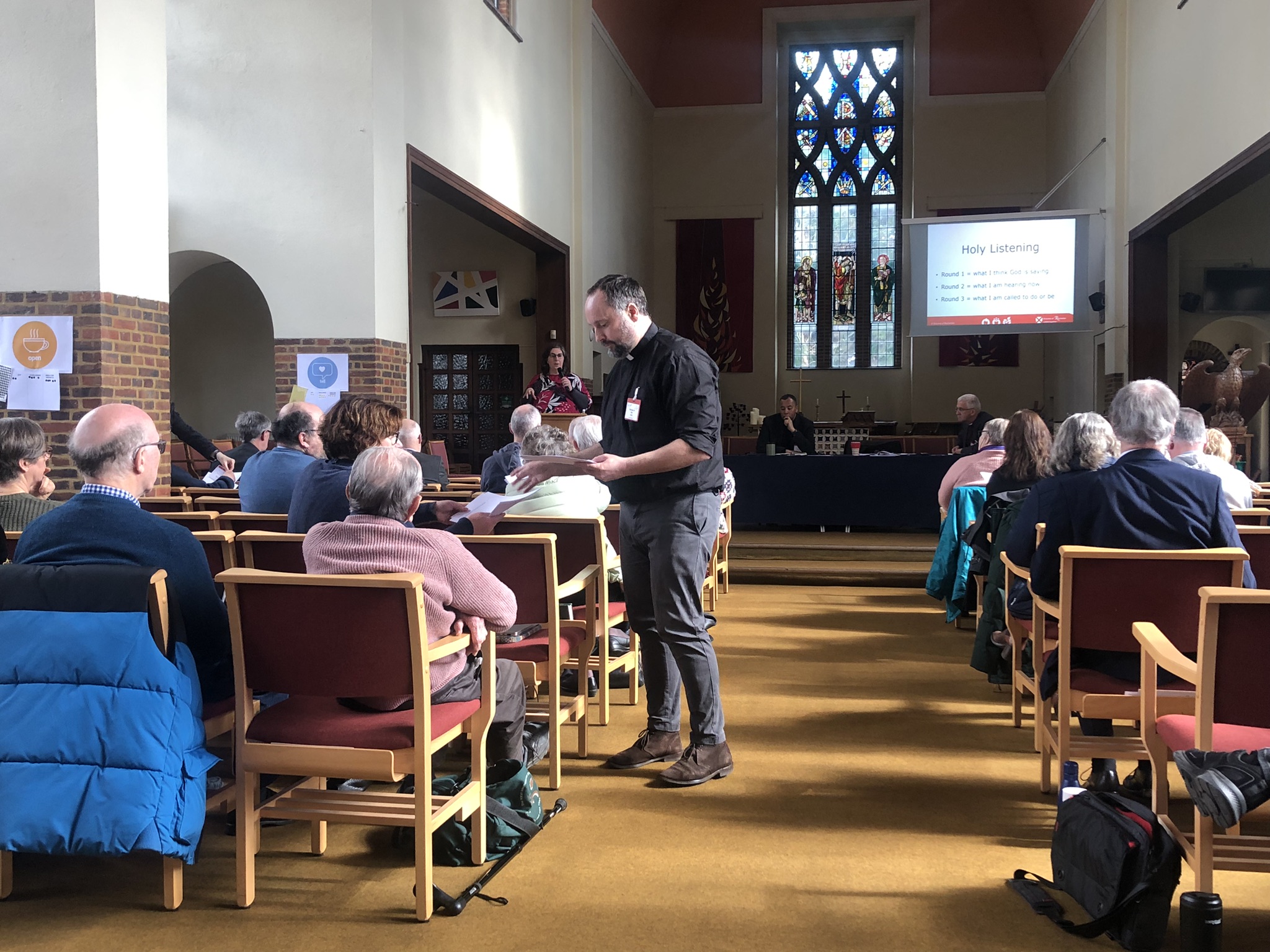
Diocesan Synod met at St Andrew’s Church, Paddock Wood on Saturday 16 March.
Much of the session was dedicated to allowing Synod members the chance to engage with and help shape the developing diocesan Called Together vision.
Bishop Jonathan Gibbs, the Bishop of Rochester, used his presidential address to outline the key elements that are emerging out of this work.
He explained that Change, Serve, and Grow, are the three themes he believed God laid on his heart when he was called to join Rochester Diocese as diocesan bishop two years ago.

Photo: Bishop Jonathan gives his presidential address
He added that these themes need to be undergirded by our commitment to prayer and to seeking the Kingdom of God as our first priority.
Synod's engagement that day would, he said, be an important part of the work being undertaken to see how these three themes can be translated in ways that help us as a diocesan family to, “seek and serve God’s kingdom more fruitfully and effectively in our churches and communities.”
Click to read more about Bishop Jonathan’s address
Safeguarding update
As part of the morning’s business, the Ven Andy Wooding Jones, Archdeacon of Rochester and Bishop’s Lead for Safeguarding, gave an update on some of the key developments within Safeguarding nationally and locally.
He spoke about the recent Future of Church Safeguarding Report which was published in February and that was discussed at the most recent General Synod.

Photo: Archdeacon Andy updates Synod on Safeguarding matters
Archdeacon Andy explained that General Synod had agreed to the setting up of a Response Group to look in more depth at the report’s recommendations.
As part of their work, they would be undertaking an engagement process across the Church to allow as many people as possible to give their views on the recommendations and any next steps.
The aim is that the Response Group will report back to General Synod in July.
Read Bishop Jonathan’s response to the Jay Report
Archdeacon Andy also drew Diocesan Synod’s attention to recent guidance that had been shared by the Diocesan Safeguarding Team on Lone Working.
Given the number of enquiries received from parishes about lone working, he said it is clear how needed the guidance is.
This is so that church leaders and others in positions of responsibility in our churches can feel safe and confident to carry out the vital pastoral and outreach work so valued by people in our communities.
Developed by the Diocesan Safeguarding Team in collaboration with the Diocesan Safeguarding Executive, this Lone Working guidance has been written to:
- Draw together several policies already being used across the Diocese.
- Address the lack of focus in other guidance on scenarios with children, young people, and vulnerable adults.
- Incorporate changes in national safeguarding policy.
He explained that the guidance applies to all church officers, meaning anyone appointed/elected by or on behalf of the Church to a post or role, whether they are ordained or lay, paid or unpaid.
To help with understanding and use of the guidance, the Safeguarding Team will be holding a series of webinars for clergy and other church officers, to explore the guidance in more detail.
Sharing Good News from the Archdeaconry of Bromley and Bexley
Continuing the regular series of ‘good news’ sharing across the archdeaconries, this time it was the turn of the Archdeaconry of Bromley and Bexley.
Through a pre-prepared video, the Ven Allie Kerr, Archdeacon of Bromley and Bexley, spotlighted some examples of good news in her area.

Photo: Archdeacon Allie introduces her video interviews
One of those is the pastoral care team at St Augustine with St Luke, Bromley Common, where the Rev Rachel Winn, curate, explained how it has become a vehicle for spiritual development.
At Holy Trinity with St John, Penge, the Rev Jessica Smith spoke about how they are growing younger by working on the link between home, church and school - effort which is bringing real benefits in terms of growth and diversity at the church.
Diocesan Synod then had an opportunity in small groups to discuss how these examples might inspire them to think creatively about mission in their communities.
Other business
In other business, the Rev Dr Joel Love, Vicar of the Parish of Rochester and one of Rochester Diocese’s General Synod reps, shared an update on the most recent General Synods in February and November.
There was also a response to a written question from the Rev Pat Lenton de Dickin, Team Vicar of Gillingham Deanery, regarding progress on racial justice across the Diocese, and on recruitment of a racial justice officer post.
Bishop Jonathan responded by thanking Pat for her question. He confirmed that a role description was being drawn up for a half-time post alongside a parish post, and that the budget was in place.
He reassured Synod that racial justice is a hugely important area and that he, Bishop Simon Burton-Jones, the Bishop of Tonbridge, the diocesan team, and the Rev Jeremy Blunden, as Bishop’s Adviser on UK Minority Ethnic / Global Majority Heritage matters and Rector of St George’s Church, Beckenham, are very committed to improving the racial diversity in leadership in our diocese.
Engaging with the developing diocesan vision
Called Together Manager, Claire Boxall, gave a brief overview of where work around the vision had got to so far and the context in which it is being developed.

Photo: Claire Boxall opens the session on the Diocesan vision
Drawing on Bishop Jonathan’s address, she said that what is becoming clear is that in all we do we, ‘Seek First the Kingdom of God.’
“This is an evolution of our strategy not a revolution.”
She explained that work around progressing the vision is a double-layered approach, with the aim of seeking to provide more focused and practical support to leaders and volunteers in every church, and then identifying and providing investment in particular places.
Most importantly, she said that the strategic thinking is being mission-led.
“Because of our shared vision we are investing for growth. We are praying that we can focus on growth in discipleship.”
“Synod’s input is vital in helping further inform Bishop Jonathan and others in where our shared diocesan focus should be.”
Synod was then guided through a process of holy listening by the Rev Dr Joel Love, and divided into deanery groups, to discern what God is saying about mission and ministry in their local area, around three questions:
- What is God saying about mission and ministry in this area?
- If you had £100,000 what would you do with it?
- In order for us to grow, how could we better serve? And what change might happen as a result?

Photo: The Rev Joel Love hands out the questions and response sheets Synod needs for the listening exercise
Members of the Diocesan Youth Council were also present and took part in the conversations.
The outcomes were gathered and will help further evolve the strategy work.
**Diocesan Synod next meets on Saturday 22 June 2024**